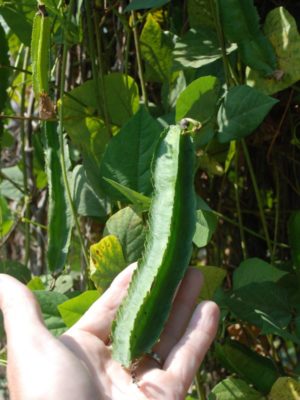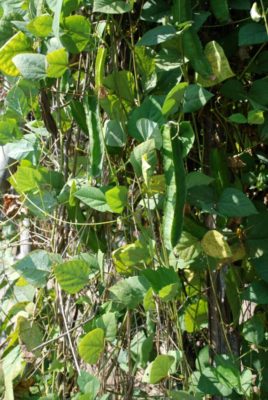
Winged bean
Winged bean is a tropical legume with large beans that are decorated with four frilled wings. Apart from the beans also leaves and roots of the plant are edible.
Names
Scientific
Psophocarpus tetragonolobus
English
Asparagus bean
Four-angled bean
Goa bean
Winged bean
Winged pea
Dutch
Vleugelboon
French
Haricot ailé
Pois ailé
Pois carré
German
Flügelbohne
Goabohne
Taxonomy
Order
Fabales
Family
Fabaceae
Genus
Psophocarpus
Species
Psophocarpus tetragonolobus (Winged bean)
Basic information and facts
Origin:
Originates from New Guinea
Distribution:
Tropical countries with a hot and humid climate, such as Philippines, Indonesia, India, Myanmar, Thailand and Sri Lanka.
Annual, biennial, or perennial:
Perennial, but often grown as an annual plant.
Plant:
Winged bean is a herbaceous climbing vine. Often stakes or trellises are used to support the plants.
Flowers:
Flowers are usually blue, bluish white, or purple. They can be used to color rice and pastries.
Leaves:
Leaves are edible and are used in a similar way as spinach.
Fruits:
The bean pods are usually 15 to 22 cm long. The beans have four wings running lengthwise, which have frilled edges.
Climate and weather:
Winged bean is a tropical legume.
Pollination:
Height:
The climbing stems can be 3 to 4 meters tall.
Spacing:
Propagation:
Grown from seed.
Insect pests:
?
Diseases:
?
Harvesting:
Harvested by hand. Fruits or leaves are hand picked.
Uses:
Most parts of the plant are edible. The beans are used as a vegetable and taste a bit like asparagus. Young leaves are used as a leaf vegetable, like spinach. Roots are used as a root vegetable, similar to the potato. The dried seeds are used as a flour.
Did you know that?
- Winged bean is a very good nitrogen fixer and therefore does not need much fertilizers.
Crop categories
Legumes
Minor crops
Podded vegetables
Tropical crops
Vegetables
Pictures

Winged bean

Winged bean

Winged bean

Winged bean

Winged bean
